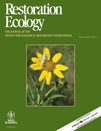
RESTORATION ECOLOGY
Scope & Guideline
Advancing the Science of Ecological Renewal
Introduction
Aims and Scopes
- Ecological Restoration Strategies:
The journal covers a wide range of ecological restoration strategies, including passive and active restoration techniques, with a focus on understanding their effectiveness in various ecosystems. - Biodiversity Enhancement:
Research published in Restoration Ecology often emphasizes the role of restoration in enhancing biodiversity, including the recovery of endangered species and the restoration of habitats that support diverse biological communities. - Socio-Ecological Perspectives:
The journal incorporates socio-ecological perspectives, investigating how social factors, community engagement, and traditional knowledge can influence restoration outcomes and practices. - Climate Change Resilience:
There is a significant focus on the implications of climate change for restoration efforts, including adaptive management strategies and the restoration of ecosystems to improve resilience against climate impacts. - Technological Innovations:
Restoration Ecology explores the integration of technology in restoration practices, such as remote sensing, drone applications, and genetic tools, to enhance the monitoring and effectiveness of restoration efforts. - Long-Term Monitoring and Assessment:
The journal emphasizes the importance of long-term ecological monitoring to assess the success of restoration projects and to inform adaptive management strategies.
Trending and Emerging
- Integration of Indigenous Knowledge:
There is a growing recognition of the importance of Indigenous knowledge systems in restoration practices, leading to collaborative approaches that respect traditional ecological knowledge and community involvement. - Focus on Ecosystem Services:
Research increasingly emphasizes the role of restored ecosystems in providing ecosystem services, such as carbon sequestration, water purification, and habitat provision, highlighting their socio-economic benefits. - Adaptive Management Frameworks:
Adaptive management frameworks are trending, with studies focusing on iterative learning and adjustment of restoration practices based on monitoring outcomes and environmental changes. - Genetic and Ecological Diversity:
Emerging research highlights the significance of genetic and ecological diversity in restoration efforts, promoting practices that enhance resilience and adaptability of restored ecosystems. - Application of Technology and Citizen Science:
The incorporation of technology, including remote sensing, drones, and citizen science initiatives, is trending as a means to improve monitoring, data collection, and public engagement in restoration projects. - Urban and Peri-Urban Restoration:
There is an increasing focus on restoration in urban and peri-urban environments, addressing challenges unique to these areas, including habitat fragmentation and human-wildlife interactions.
Declining or Waning
- Traditional Restoration Techniques:
There has been a noticeable decline in publications focused solely on traditional restoration techniques, such as simple replanting or seeding, as new methods and technologies emerge. - Single-Species Restoration:
Research dedicated exclusively to single-species restoration efforts is becoming less common, with a growing emphasis on multi-species approaches and ecosystem-level restoration. - Invasive Species Control:
While still relevant, the frequency of studies focused solely on invasive species control has decreased, as the field shifts toward understanding complex interactions and ecosystem dynamics. - Static Reference Models:
The reliance on static reference models for assessing restoration success is declining as researchers increasingly advocate for dynamic, context-dependent approaches that consider historical and future conditions. - Local Seed Sourcing:
Interest in local seed sourcing as a standalone topic is waning, with researchers now exploring broader genetic and ecological considerations in restoration planning.
Similar Journals
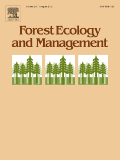
FOREST ECOLOGY AND MANAGEMENT
Transforming Insights into Action for Forest HealthFOREST ECOLOGY AND MANAGEMENT is a premier peer-reviewed journal dedicated to the integral study of forest ecosystems and their management, published by Elsevier in the Netherlands. With an impactful presence in the field, this journal boasts a prestigious Q1 ranking in multiple categories, including Forestry, Management, Monitoring, Policy and Law, and Nature and Landscape Conservation as of 2023. It addresses key issues relevant to sustainable forest practices, conservation strategies, and environmental monitoring, making it a vital resource for researchers, practitioners, and policymakers alike. The journal is indexed with an impressive Scopus rank, placing it among the top tier of titles in Agricultural and Biological Sciences and Environmental Science. While it does not offer Open Access options, its rigorous review process and high visibility make it essential for those seeking to stay abreast of the latest findings and trends in forest ecology and management. Published continuously since 1976, FOREST ECOLOGY AND MANAGEMENT aims to foster interdisciplinary collaboration and advance knowledge critical to the stewardship of forest resources in an ever-changing global landscape.

WETLANDS ECOLOGY AND MANAGEMENT
Fostering interdisciplinary dialogue in wetland science.Wetlands Ecology and Management, published by Springer, is an esteemed journal that has been advancing the field of wetland studies since its inception in 1982. Operating under the ISSN 0923-4861 and E-ISSN 1572-9834, this journal is headquartered in the Netherlands and serves as a critical resource for researchers, professionals, and students alike. It fosters interdisciplinary dialogue among aquatic science, ecology, and resource management disciplines, ranking in the Q2 category for Aquatic Science and Ecology, Evolution, Behavior and Systematics as of 2023. With a notable Scopus ranking, it is positioned favorably within the 65th percentile in Ecology and a commendable 58th percentile in Aquatic Sciences. The journal emphasizes the importance of effective management strategies and policies in the conservation of wetlands, making it indispensable for those aiming to drive impactful research. Although it is not an open-access journal, its high-quality publications remain accessible through library consortia and institutional subscriptions, ensuring that pertinent insights into the ecological dynamics and sustainable management practices are available to the global research community.
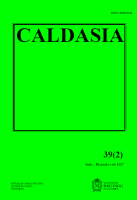
CALDASIA
Cultivating Research to Nourish the WorldCALDASIA is a distinguished open-access journal dedicated to the field of Agricultural and Biological Sciences, published by INST CIENCIAS NATURALES, MUSEO HISTORIA NATURAL since its inception in 1981. Based in Colombia, this journal plays a pivotal role in disseminating scientific knowledge and fostering research collaboration across the globe. With a focus on diverse subjects within the biological sciences, CALDASIA aims to bridge gaps in research and support scholars, professionals, and students in advancing their work. With a 2023 Scopus Ranking of #132 out of 221 in its category, representing a 40th percentile ranking, it holds a solid position in the academic community, particularly recognized for its contributions to miscellaneous areas within agricultural and biological sciences. The journal remains committed to enhancing accessibility, as evidenced by its open-access policy since 2001, thereby ensuring that research findings reach a wider audience without barriers. For those returning to this vibrant field, CALDASIA serves as an essential resource for contemporary findings and discussions that shape environmental and biological scholarship.

Austrian Journal of Forest Science
Pioneering insights in forestry and environmental policy.Austrian Journal of Forest Science, published by OSTERREICHISCHER AGRARVERLAG, is a distinguished peer-reviewed journal dedicated to advancing knowledge in the fields of forestry and ecological science. With an ISSN of 0379-5292 and an E-ISSN of 0375-524X, this journal serves as a vital platform for researchers, professionals, and students alike, aiming to disseminate innovative research findings, methodologies, and case studies pertinent to forest conservation, management, and policy. Situated in Austria, its diverse scope encompasses critical topics within ecology, evolution, and biodiversity, evidenced by its competitive quartile rankings in 2023, placing it in Q2 for Forestry and Q3 in other related fields. The journal is committed to fostering a deeper understanding of forest ecosystems, making it an essential resource for anyone invested in sustainable forestry practices and environmental policy.
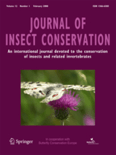
JOURNAL OF INSECT CONSERVATION
Fostering Knowledge for a World Rich in InsectsJOURNAL OF INSECT CONSERVATION, published by SPRINGER in Switzerland, is a leading peer-reviewed journal that focuses on the preservation and study of insect biodiversity and ecology. With an ISSN of 1366-638X and E-ISSN 1572-9753, this journal represents a vital resource for researchers and practitioners in the fields of Animal Science, Ecology, and Insect Science. The journal consistently ranks among the top quartiles, achieving Q1 status in Animal Science and Zoology and Q2 in other pertinent categories in 2023, according to Scopus rankings. This reflects its significant influence in the academic community, with a solid impact factor that highlights its importance in advancing the discourse on insect conservation. Though not an open access journal, it provides critical insights and innovative research findings from 1997 to 2024, making it an essential platform for those involved in the conservation of insect species and their habitats. As a scholarly resource, the JOURNAL OF INSECT CONSERVATION is dedicated to fostering knowledge dissemination and inspiring future research in pressing environmental issues.
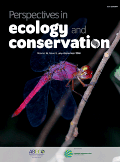
Perspectives in Ecology and Conservation
Championing open access to empower conservation efforts worldwide.Perspectives in Ecology and Conservation, published by Elsevier Science Ltd, is a leading academic journal dedicated to advancing the fields of ecology, conservation, and environmental management. With a Q1 ranking in multiple categories, including Ecology, Management, Monitoring, Policy and Law, and Nature and Landscape Conservation, this journal boasts an impressive standing among its peers, making it essential reading for researchers and professionals. Since its inception in 2017 and running through 2024, it aims to provide innovative perspectives and critical analyses that enhance our understanding and practices in conservation science. The journal is accessible through open access options, facilitating broader dissemination of knowledge. Its commitment to addressing contemporary ecological challenges reinforces its importance in the academic community, promoting sustainable practices and informed policy-making in the face of urgent environmental issues.
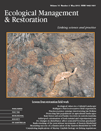
ECOLOGICAL MANAGEMENT & RESTORATION
Elevating biodiversity: A journal for change-makers.Ecological Management & Restoration is a premier international journal published by Wiley, dedicated to advancing the fields of ecology, environmental management, conservation, and restoration practices. With an impact factor that positions it in the Q2 category across various ecological and management domains, this journal serves as a critical platform for researchers and professionals seeking to address contemporary issues related to ecosystem health, biodiversity, and sustainable management. Covering a wide range of topics from ecological restoration techniques to policy impacts on nature conservation, the journal caters to a diverse audience and contributes to the scientific community's understanding of environmental challenges. Importantly, the journal provides significant visibility, ranking in the top percentiles within key ecological research arenas such as Nature and Landscape Conservation, reinforcing its value for researchers aiming to influence both scientific thought and practical applications in ecology and management. The journal's commitment to disseminating high-quality research makes it an essential resource for students, researchers, and practitioners dedicated to fostering a sustainable future.

Contemporary Problems of Ecology
Fostering Sustainable Solutions Through Scholarly DialogueContemporary Problems of Ecology, published by MAIK NAUKA/INTERPERIODICA/SPRINGER, is a premier journal committed to advancing research in the field of Environmental Science. Since its inception in 2008, this journal has carved a niche for itself in addressing the pressing ecological challenges of our times, catering to an audience comprising researchers, professionals, and students dedicated to the sustainability and environmental health of our planet. The journal is indexed in Scopus, with a current ranking of #165 out of 233 in the Environmental Science category, reflecting its contributions to the academic community, despite its position in the 29th percentile. With the latest quartile ranking placing it in Q3 for miscellaneous Environmental Science from 2023, the journal continues to be a vital resource for disseminating innovative research findings. Contemporary Problems of Ecology promotes open access scholarship and aims to foster a dialogue among experts, making it an essential platform for those looking to engage with contemporary ecological issues and solutions. The journal actively seeks to publish original research articles, reviews, and case studies that push the boundaries of our understanding of environmental systems.
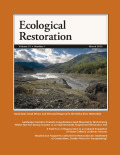
Ecological Restoration
Pioneering solutions for a sustainable planet.Ecological Restoration is a renowned journal published by University of Wisconsin Press, focusing on the critical and evolving field of ecological restoration. With its inception dating back to 1999 and converging through the years to 2024, the journal has carved out a significant niche, reflected in its recognition within the Q3 category of Nature and Landscape Conservation for 2023. Although the journal is not readily available as open access, it offers an essential platform for researchers, professionals, and students to publish their findings and collaborate across diverse topics relevant to environmental science and restoration practices. Ranked #123 out of 211 in its Scopus category and positioned in the 41st percentile, Ecological Restoration is dedicated to advancing the dialogue surrounding restoration techniques, ecological health, and sustainability efforts in response to ongoing global environmental challenges. This makes it a vital resource for anyone committed to enhancing the integrity of our natural ecosystems.

Global Ecology and Conservation
Connecting researchers to inspire ecological stewardship.Global Ecology and Conservation, published by Elsevier, stands as a premier open-access journal dedicated to advancing the field of ecology and conservation science. Since its inception in 2014, the journal has facilitated the dissemination of high-quality research, fostering critical dialogue on ecosystem management, biodiversity preservation, and sustainability practices across the globe. With a remarkable ranking within the top quartiles (Q1) in various categories including Ecology, Evolution, Behavior and Systematics, and Nature and Landscape Conservation, it is positioned among the leading resources for researchers and professionals alike. The journal has garnered a notable impact, ranking #65 out of 721 in Ecology, and houses articles that are vital to understanding and addressing the pressing environmental challenges of our time. Available in an open-access format, researchers can freely access and share vital findings, promoting a collaborative approach to ecological research. Global Ecology and Conservation is not just a publication; it is a critical tool for innovation and advocacy in conservation, poised to inspire the next generation of environmental stewards.